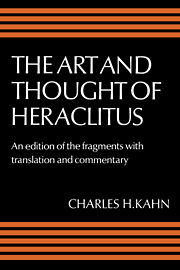 The Art and Thought of Heraclitus
The Art and Thought of Heraclitus Book contents
- Frontmatter
- Contents
- Preface
- Dedication
- Bibliography and abbreviations
- General introduction
- Introductory note to text and translation
- The fragments
- On reading Heraclitus
- Commentary on the fragments
- Appendices
- I Dubious quotations from Heraclitus
- II Doxographic reports
- III Heraclitus and the Orient, apropos of a recent book by M.L. West
- Notes
- Concordances
- Indexes
II - Doxographic reports
Published online by Cambridge University Press: 26 February 2010
- Frontmatter
- Contents
- Preface
- Dedication
- Bibliography and abbreviations
- General introduction
- Introductory note to text and translation
- The fragments
- On reading Heraclitus
- Commentary on the fragments
- Appendices
- I Dubious quotations from Heraclitus
- II Doxographic reports
- III Heraclitus and the Orient, apropos of a recent book by M.L. West
- Notes
- Concordances
- Indexes
Summary
(A) From the Life of Heraclitus in Diogenes Laertius (IX.7–11), following an epitome from Theophrastus' Opinions of the Natural Philosophers.
7. In general his opinions are these: all things are composed out of fire and dissolved into it. Everything takes place according to Fate, and things are harmoniously fitted together by the transformation of opposites.437 Also, all things are full of souls (psychai) and divine spirits (daimones). He discussed all the phenomena which occur in the cosmos, and said the sun is the size it appears (cf. XLVII, D. 3). Another saying of his: ‘You will not find out the limits of the soul by going, even if you travel over every way, so deep is its logos’ (XXXV, D. 45). And he said that conceit is a sacred disease [i.e. epilepsy] and seeing is being deceived (D. 46: see Appendix I above). His book contains some brilliant, clear passages, which even the dullest can easily understand and hence get some spiritual enrichment (literally ‘elevation of soul’). The brevity and density (baros ‘weight’) of his style are incomparable.
8. In detail his doctrines are these: Fire is the elementary principle (stoicheion) and all things are an exchange for fire (cf. XL, D. 90), produced by rarefaction and condensation. But he does not expound this clearly. Everything occurs through opposition (cf. LXXXI, D. A22), and the whole world flows like a river (cf. L, D. 12 and LI, D. 91); but the universe is finite, and there is one world (cf. XXXVII, D. 30). […]
- Type
- Chapter
- Information
- The Art and Thought of HeraclitusA New Arrangement and Translation of the Fragments with Literary and Philosophical Commentary, pp. 290 - 296Publisher: Cambridge University PressPrint publication year: 1979


